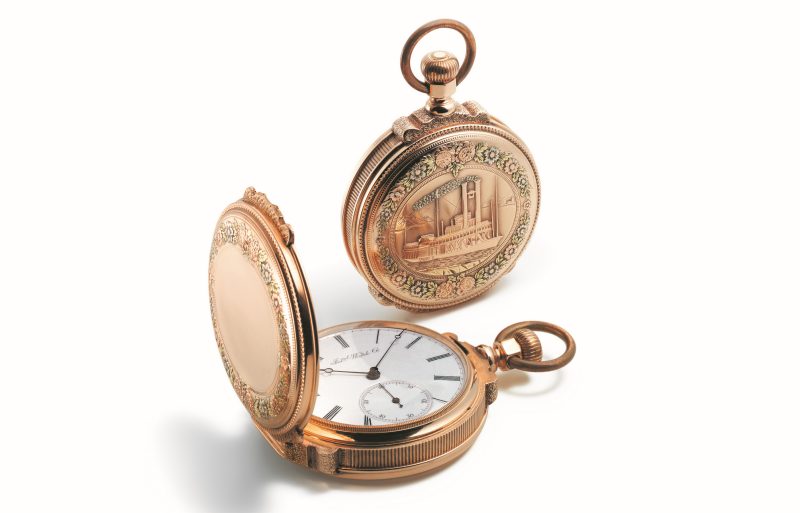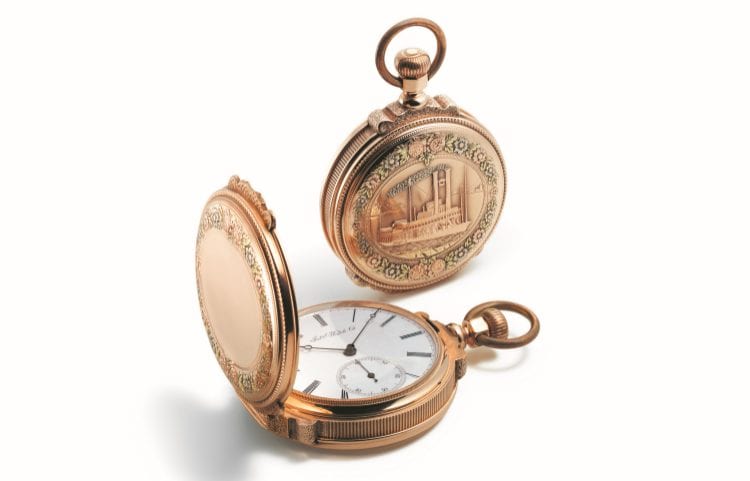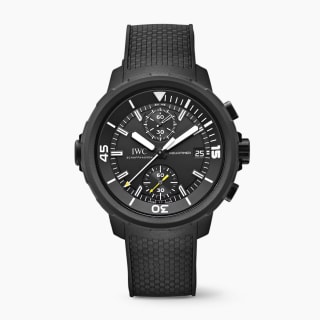
The Journal
Florentine Ariosto Jones - Founder of IWC
Shipping and delivery conditions

One of the most important yet enigmatic figures in IWC’s history—and indeed in American and Swiss watchmaking—is Florentine Ariosto Jones, who founded IWC in 1868.
Despite IWC’s prominent role in modern horology and Jones’s legendary status as a pioneer of the watchmaking age, remarkably little is known about him. We have his birth records—he was born in Rumney, New Hampshire, in 1841, to Solomon and Lavinia Craig Jones—and we know he served in the Civil War with the 13th Massachusetts Infantry.
In the Library of Congress archives, a hand-colored tintype, dated between 1861 and 1865, may show Jones as a young soldier (he would have been twenty at the war’s onset). In the photograph, he holds a large pocket watch near his heart and wears an expression of slight bewilderment—a fitting touch for the man who, upon enlisting, listed his occupation simply as “watchmaker.”
Jones went on almost immediately after the cessation of hostilities to work for one of the best watchmaking firms in America: the firm of E. Howard & Co. He was eventually to rise to the rank of the superintendent of the factory, but in 1867 he applied for a passport and traveled to Europe, looking for some place to establish a watchmaking business of his own, using the so-called “American System” of watchmaking.
This system was originally derived from manufacturing methods developed for the Federal armories at Springfield and Harpers Ferry, where high precision interchangeable parts were needed for armaments –a requirement that made the system (also originally known as the “armory system”) ideal for watchmaking. F.A. Jones was one of the few American pioneers who transferred the principles of the American system of manufacturing into watchmaking.
— Movement components for the production of the Jones caliber. The original work box from movement assembly vividly demonstrates the individual processes involved in manufacturing and assembling the individual movement components.
Combining all the excellence of the American system of mechanism with the more skillful hand labor of the Swiss.
Florentine Ariosto Jones’ business plan was laid out as follows: “Combining all the excellence of the American system of mechanism with the more skillful hand labor of the Swiss” to manufacture high quality watches exclusively for the US Market. So in 1868, after traveling extensively in Switzerland to find the best possible site for his venture, he and his traveling companion Charles Kidder (another American watchmaker) founded, in Schaffhausen, the company that would become the International Watch Company (according to one surviving document, the Schaffhausen firm’s original name was simply F. A. Jones & Co.) The Marketing and Sales Department of the “International Watch Company” was based in Maiden Lane 5, New York City.
— Florentine Ariosto Jones (1841-1916), a watchmaker from Boston, Massachusetts, founds the International Watch Company in Schaffhausen.
A major advantage in locating the firm in Schaffhausen was the topography of the region, which provided ample water power for driving the machinery on which Jones’ manufacturing model was based. Movements that survive from the era are generally high quality, sturdily built machines –many with the long, thin index for precision regulation that is still identified with Jones-era movements today — that exemplify the best of the American watchmaking system: precision engineering combined with skilled hand work in finishing, assembling, and regulating.
Jones himself returned to the United States, in 1876, after a period of what must have been very frustrating conflict with some of his company’s board of directors. In Schaffhausen, among the watch makers of IWC and his good friends, he was still highly appreciated and his vision was highly respected. He would go on to other work in mechanics and engineering, before retiring and finally passing away in 1916.
But perhaps Jones would have taken comfort in the fact that his spirit still survives in the approach IWC takes to making watches in the 21st century. All these decades after the passing of its founder, IWC still emphasizes the values that were part of his vision from the outset: making solid, reliable, highly precise, robust watches that have both the dignity of well-made and functionally irreproachable machines, as well as being shaped by the irreplaceable work of skilled craftspeople. It’s in this combination of functional integrity, and restrained elegance in execution, that the vision of Florentine Ariosto Jones is alive today at IWC.
































































































